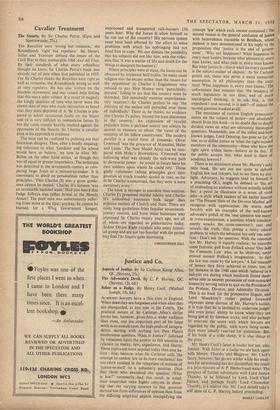. justice and Co.
Aspects of .Justice. By Sir Carleton Kemp Allen, QC., (Stevens, 25s.) The Advocate's Devil. By C. P. Harvey, QC. (Stevens, 12s. 6d.)
ACADEMIC lawyers have a thin time in England. When dead .they are-forgotten and when alive-they are •disregarded, at any rate in the Courts. The practical nature of. Sir Carleton .Allen's, earlier -books has, however, given .him a. wider audience than most, and the ,irnportant ,part of his latest work.is an assault upon the high,peaks.of,jurispru- dence, starting with nothing. less than . Plato's momentous, question 'What.,is Justice?' followed by variations upon the .answer to this question in relation to mercy, °law,- expedience, and liberty. These topics,gre more in point today than ever be- Lore : first, because what Sir Carleton calls .`the attempt to confine law to its..mere mechanics' has too often resulted in the relegation of• notions- of 'justice-in-itself', to. •a subsidiary . position. (Not that those who examined the question ;What is law?' •necessarily had this result in mind; their researches were highly .relevant; in show- ing that the varying answers to that question derived less from differences of opinion than from the differing empirical objects exemplifying the concept law' which each answer contained.) The second reason is the general confusion of justice with benevolence traceable to Bentham, whose outlook is here demonstrated in his reply 'to the proposition that 'justice is the end of govern- ment' : 'Why not happiness? What happiness is, every man knows, because what pleasure is, every man knows, and what pain is, every man knows. But what justice is—this is what on every occasion is the subject-matter of dispute.' As Sir Carleton points out, there was never a more monstrous assumption in all philosophy than the state- ment 'What happiness is, every man knows.' The unfortunate fact remains that 'the tendency of much legislation in our time, and of much sociological thinking, is to, ask first, is this expedient? and second, is it just?—if indeed the second question is asked at all.'
The muzziness of current English pronounce' ments .on the subject .of justice—not absolutely absent from this book—is no doubt, due to deeplY divided views on what are ultimately theological questions. Meanwhile, one of the ablest and best- known judges, Lord Denning, has gone so far, or low, as to define justice as 'what the right-minded members of the community—those who have the right spirit within them—believe to be fair.' If the public accepts this, what need is there of academic lawyers?
There is no muzziness about Mr. Harvey's saltY little book. He sets out not quite to debunk English law and lawyers, but to see them by day- light. Advocacy, he suggests (and he himself is a practising QC), might be defined as 'the art of misleading 'an audience without actually telling lies,' a point he illustrates in a series of vivid jabs—a style which readers of his earlier treatise on 'The Present State of the Divorce Markel'oill recognise with appreciation. He scores most forcibly with his examples of the well-known advocate's pitfall of the 'one question too many' in cross-examination, a question which simultan- eously wrecks the cross-examiner's case and reveals the truth, thus posing a nasty ethical problem to which the advocate has only one solu- tion :• Don't ask the question. With the common law Mr. Harvey is equally realistic; he unearths some fantastic guff from Pollock about 'Our lady the Common Law' who, as he observes, never existed outside Pollock's imagination : 'in fact the law was made by the lawyers.' A fair measure of lunacy they have achieved at times, too, as for instance in the 1948 case which 'ushered in a halcyon era during which landlords found them- selves able to recover possession of rent-restricted houses by serving notice to quit on the President of the Probate, Divorce, and Admiralty Division.' This is no book for the prospective litigant, and Lord Mondkron'§- rather pained foreword expresses sortie distrust of Mr.-Harvey's tactics; it is 'true that 'he 'is inclined:to underrate judges' and even juries' ability 'to know ',when' 'they are being 'got at by forensic tricks, and 'also-perhaps to overrate the'. scorn with which lawyers are regarded by the public, such scorn being .nowa- days more usually' reserved for politicians. But, if his book is a trifle cheap, it is also cheap- at 'the price.
Mr. Henry Cecil's latest is' louder but-not, alas, funnier. With Sober as a Judge we are back again with Messrs. Thursby 'and Blagrove. Mr. Cecil's fancy, however,. has grown wilder' while his weak- ness for sermonising hasliot diminithed;'the result is a Prim mixture of A. P. Herbert-and-water. The prospect of further adventures with Lord Justice ThiirsbY, to be fdllbwed by Lord, Lord Chief Justice, and perliiip,, finally Lord Chancellor Thursby, is a salemn one. Mr. Cecil should take a stiff dose of C. P. Harvey before proceeding:


































 Previous page
Previous page